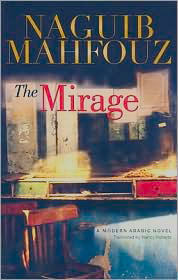Note: Naguib Mahfouz was WINNER of the Nobel Prize for Literature in 1988.
“My mother and my life were one and the same….Hardly can I think of any aspect of my life without her beautiful, loving face appearing before me. She stands ever and always behind both my hopes and my sufferings, behind both my love and my hatred….It’s as though she herself was everything I’ve ever loved or hated.”
Naguib Mahfou z is a never-ending source of literary surprises. In this unusual and often charming novel from 1948, newly translated and republished by the American University of Cairo, Mahfouz writes his only Freudian, psychological study, an analysis of Kamil Ru’ba Laz, a young Egyptian man so dominated by his mother that he is unable to make a single decision or form a single successful relationship with the outside world. When the novel opens, his mother has just died, and Kamil, in his mid-twenties, is devastated. Though he believes that “people who write are, generally speaking, people who aren’t alive,” he recognizes that he was not really alive before his mother’s death. He hopes that writing will allow him “to remember her and to recover her life…[so that] I may be able to repair the thread of my life that’s been broken.”
z is a never-ending source of literary surprises. In this unusual and often charming novel from 1948, newly translated and republished by the American University of Cairo, Mahfouz writes his only Freudian, psychological study, an analysis of Kamil Ru’ba Laz, a young Egyptian man so dominated by his mother that he is unable to make a single decision or form a single successful relationship with the outside world. When the novel opens, his mother has just died, and Kamil, in his mid-twenties, is devastated. Though he believes that “people who write are, generally speaking, people who aren’t alive,” he recognizes that he was not really alive before his mother’s death. He hopes that writing will allow him “to remember her and to recover her life…[so that] I may be able to repair the thread of my life that’s been broken.”
The first person novel which results is Kamil’s attempt to put his life into some sort of perspective and, perhaps, to find some hope for the future, some understanding of “life’s true wisdom,” a journey which will take him outside himself for the first time in his life. As Kamil takes the reader through his family history, other dysfunctional relationships within his family are revealed. Kamil never knows his father, but when Radiya and Medhat, the two older children, are aged ten and nine, their father claims them, in accord with Islamic law, wresting them from their mother and preventing her from seeing them for many years, leaving her with only Kamil, a small child, to love.

His mother nurtures what Kamil later recognizes as an “unwholesome relationship…a kind of affection that destroys.” He is never out of his mother’s sight and is encouraged to depend on her totally—sleeping in the same room and having no sense of personal privacy. He grows up isolated, unable to meet other young people or have friends, terrified of the outside world, and excruciatingly shy, completely unable to speak to strangers. School is a disaster. Only dreams bring escape. When he has reached his twenties and has started working as a clerk in the War Ministry, he notes, “I seem to have been destined not to know anything about life’s true wisdom, and I’d never gone beyond the narrow confines of my own soul.”
With a totally egocentric life, and a mother who constantly massages that ego while simultaneously demanding his full attention, Kamil is certainly not a candidate for true love, which he has no way of understanding, but Mahfouz introduces Kamil’s desire for a wife as the turning point of the book. His search for love, his selection of the woman of his dreams, the complications this potential relationship creates with his mother, the effects of his pathological fears on any long-term relationship, and his complete naivete about sex and what it means to be a husband all reflect the influence of his early childhood on his adult life. Kamil, in his mid-twenties, is still a child, emotionally, with no idea of how to communicate with the outside world on any level.
Mahfouz has created in Kamil a main character whom it is difficult to like, and now, sixty years after this book was written, it is somewhat difficult even to empathize with him since times have changed so much. Still, Kamil’s conversational style, his charm, and his easy-going humor about growing up keep the reader completely engaged, hoping for Kamil’s success even when tempted to give up on him as a lost cause. Firmly grounded in the psychological conundrum that Kamil represents, Mahfouz stays true to his subject as he explores the effects of family on character, taking the extreme examples of Kamil and his mother to their limits to evaluate whether or not there is some kernel of individuality which can survive even the most extreme influences in order to preserve one’s essence and allow for growth in new and contrary directions.
ALSO: THE DAY THE LEADER WAS KILLED, KARNAK CAFE, CAIRO MODERN, IN THE TIME OF LOVE
Notes: Many other novels by Naguib Mahfouz posted here. See Authors’ tab at the top of the Home page, if interested.
The author’s photo is from http://en.wikipedia.org
